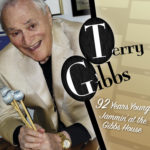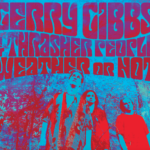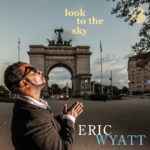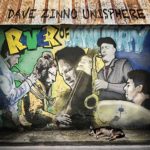 Two Gibbs releases in the top ten for the year!
Two Gibbs releases in the top ten for the year!
 #19, Eric Wyatt Look to the Sky (Peaked at #17, 6 weeks) Brooklyn-born and bred Eric owns a solid berth along the saxophone continuum originally laid out by guys like Parker, Coltrane and Rollins. Throughout his career, his playing has been edgy and inventive, heartfelt and poignant. In fact, his father was good friends with Rollins and after Wyatt’s dad passed away, Sonny Rollins became involved in Eric’s music. “After my dad passed in 1989, Sonny became very present in my music and offered his help. I was given the opportunity to record my first CD, Godson, on the Japanese label King Records. Sonny suggested the title Godson because it explained his and my dad’s Hope. The Godson CD featured Al Foster, Rufus Reid and Mark Soskin, all members of Sonny’s bands. Look to the Sky, Wyatt’s debut for Whaling City Sound and his sixth recording overall, is magnificently realized, both instrumentally and emotionally. There are musical nods to his father (“Jolley Charlie”) and mother (“Psalm for Phennie”), to Coltrane (“My Favorite Things”) and a few other intimate touch-points, some original, a few written by his accompanist, Benito Gonzalez. Indeed, Wyatt is joined here by excellent progressive musicians, including the resounding pianist Gonzalez, drummers Shinnosuke Takahashi and Kyle Pool, Eric Wheeler on bass and Keyon Harrold on trumpet. Together, their music is filled with hope and dedication, reciprocity and passion. With every recording, Wyatt flourishes, in terms of artistry and intensity, power and finesse. Look to the Sky is the man’s—and his band’s— finest and fullest record yet.
#19, Eric Wyatt Look to the Sky (Peaked at #17, 6 weeks) Brooklyn-born and bred Eric owns a solid berth along the saxophone continuum originally laid out by guys like Parker, Coltrane and Rollins. Throughout his career, his playing has been edgy and inventive, heartfelt and poignant. In fact, his father was good friends with Rollins and after Wyatt’s dad passed away, Sonny Rollins became involved in Eric’s music. “After my dad passed in 1989, Sonny became very present in my music and offered his help. I was given the opportunity to record my first CD, Godson, on the Japanese label King Records. Sonny suggested the title Godson because it explained his and my dad’s Hope. The Godson CD featured Al Foster, Rufus Reid and Mark Soskin, all members of Sonny’s bands. Look to the Sky, Wyatt’s debut for Whaling City Sound and his sixth recording overall, is magnificently realized, both instrumentally and emotionally. There are musical nods to his father (“Jolley Charlie”) and mother (“Psalm for Phennie”), to Coltrane (“My Favorite Things”) and a few other intimate touch-points, some original, a few written by his accompanist, Benito Gonzalez. Indeed, Wyatt is joined here by excellent progressive musicians, including the resounding pianist Gonzalez, drummers Shinnosuke Takahashi and Kyle Pool, Eric Wheeler on bass and Keyon Harrold on trumpet. Together, their music is filled with hope and dedication, reciprocity and passion. With every recording, Wyatt flourishes, in terms of artistry and intensity, power and finesse. Look to the Sky is the man’s—and his band’s— finest and fullest record yet.
 Dave Zinno Unisphere River of January (Chartbound) The songs are lavish jazz adventures, rich with texture, ripe with melodicism, and simply joyful audio journeys. The band is spectacular: Unisphere includes the talents of sax man Mike Tucker (Arturo Sandoval), drummer Rafael Barata (Milton Nascimento, Marc Johnson), Leo Genovese (Joe Lovano, Esperanza Spaulding), and Crescent City trumpeter Benny Bloom. Zinno leads them the way a hopeless romantic treats a first love: gently, understanding and worshipful. He glorifies his accompanists and allows them to go on at length, indulging their considerable talents and making River of January a wall of glorious of sound. This isn’t to say that it’s stodgy. Zinno infuses the work with progress. The band takes the vibe of traditional jazz and reverses the paradigm, so the songs, while familiar, certainly don’t remain the same. There are many highlights here, and while it wouldn’t be a waste of space to speak about them individually, it would be easier to say that these tunes all include rushes of adrenaline, sweetness of melody and serious elements of style. River of January is a work of forward thinking tradition and one that has much substance within it to discover.
Dave Zinno Unisphere River of January (Chartbound) The songs are lavish jazz adventures, rich with texture, ripe with melodicism, and simply joyful audio journeys. The band is spectacular: Unisphere includes the talents of sax man Mike Tucker (Arturo Sandoval), drummer Rafael Barata (Milton Nascimento, Marc Johnson), Leo Genovese (Joe Lovano, Esperanza Spaulding), and Crescent City trumpeter Benny Bloom. Zinno leads them the way a hopeless romantic treats a first love: gently, understanding and worshipful. He glorifies his accompanists and allows them to go on at length, indulging their considerable talents and making River of January a wall of glorious of sound. This isn’t to say that it’s stodgy. Zinno infuses the work with progress. The band takes the vibe of traditional jazz and reverses the paradigm, so the songs, while familiar, certainly don’t remain the same. There are many highlights here, and while it wouldn’t be a waste of space to speak about them individually, it would be easier to say that these tunes all include rushes of adrenaline, sweetness of melody and serious elements of style. River of January is a work of forward thinking tradition and one that has much substance within it to discover.


 Music industry consultant and publicist Ginny Shea has garnered international exposure for her clients through radio and video promotion, print media, and her vast industry network.
Music industry consultant and publicist Ginny Shea has garnered international exposure for her clients through radio and video promotion, print media, and her vast industry network.
